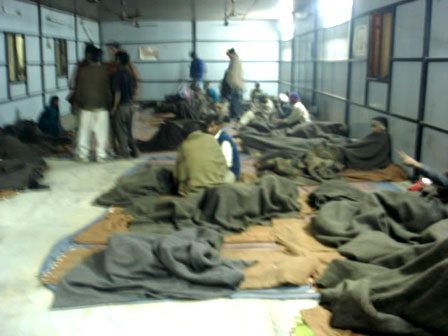 Carwyn Gravell of the United Kingdom writes of “The spiritual value of night shelters for homeless people”
Carwyn Gravell of the United Kingdom writes of “The spiritual value of night shelters for homeless people”
26th September 2014
Six months on from the launch of my report Lost and Found: faith and spirituality in the lives of homeless people, it’s time to get practical. With additional funding for the project now secured we’re delighted to be able to continue our work with The Connection at St Martin’s and other homeless service providers to look at ways of implementing the report’s recommendations: developing materials and approaches for conducting life interviews with service users with faith and spirituality as a theme, building good practice on establishing stronger links between homeless agencies and local faith groups, and creating and sharing resources for running spirituality discussion groups with service users. (To find out more or to get involved in the next phase of this action research please email info@lemosandcrane.co.uk.)
My first task in thinking through the practical implications of incorporating faith and spirituality within service provision for homeless people came recently at Housing Justice’s National Night Shelter Coordinators Conference, where I was asked to talk about Lost and Found. The conference took place at Scargill House in the heart of the Yorkshire Dales, home to a resident community of many Christian traditions committed to a common rule of life and service, that also offers a warm welcome to conference delegates from different walks of life, as well as a place of retreat for homeless people.
Speaking to the various night shelter co-ordinators at the event – as the number of homeless people rise across the country, new night shelters are being set up all the time – I was struck by the enormous contribution that churches, places of worship, and volunteers from faith communities are making to help those in desperate need. As well as helping homeless people materially, night shelters provide significant social, emotional and spiritual nourishment. Inspired by their faith (though not in an explicit or evangelising way), many co-ordinators and volunteers bring to their work a belief in unconditional friendship, care and hospitality, placing great importance on things like eating together with guests, talking about life experiences as equals and creating simple bonds of pure humanity in doing so. The Scargill Movement’s motto is ‘lives shared, lives transformed’, which sums up rather well what night shelters at their best can achieve, helping homeless people believe that they still belong in society even though they have lost so much in their lives and can often feel ashamed and outcast, and that others care for their well-being as people not just service users.
My thanks to Paul Reily from Housing Justice and all the night shelter coordinators – new friends I feel I’ve made – for inviting me to speak at their conference. And thanks to Phil Stone and everyone at Scargill House for their wonderful hospitality.
Tags: Homelessness


Thanks for sharing this article. The Night shelters need more attention, especially under Catholic auspices, where the opportunity is there–all night long. The challenge of giving night time is great, but so is the precious opportunity.